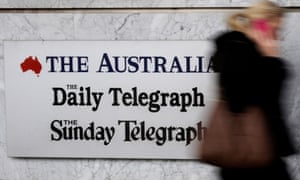Reaction to a savage attack on Labor leader Bill Shorten suggests something may be changing in News Corp’s Australian newspapers
There
is nothing new about attacks on News Corp’s influence on policy and
politics in Australia. There is nothing new about claims that Rupert
Murdoch’s newspapers are not just right wing, but distort and
manufacture news, campaigning for favoured political parties without the
obligation of fairness. There is nothing new about concern over the
impact the company, which controls 70% of the country’s newspaper
circulation, might have on democratic debate.
But this old story has a new twist as Australia prepares for an election, a hint that something is changing.
The opposition Labor party, which once believed it had no choice but to court senior News Corp executives, now openly criticises it, perhaps believing its power is waning as the media fragments, or that its bias might even help them at next Saturday’s poll.
Even more surprisingly, several respected News Corp insiders are speaking against their organisation’s bias, particularly at Murdoch’s flagship Australian newspaper.
“This sounds like the first time since 1975 that the journalists at
the Australian have actually stood up and said something,” says
associate professor David McKnight from the University of New South
Wales, who has written extensively on Murdoch.But this old story has a new twist as Australia prepares for an election, a hint that something is changing.
The opposition Labor party, which once believed it had no choice but to court senior News Corp executives, now openly criticises it, perhaps believing its power is waning as the media fragments, or that its bias might even help them at next Saturday’s poll.
Even more surprisingly, several respected News Corp insiders are speaking against their organisation’s bias, particularly at Murdoch’s flagship Australian newspaper.
A letter from journalists to management took issue with the “deliberate and careless slanting of headlines, seemingly blatant imbalance in news presentation, political censorship and, more occasionally, distortion of copy from senior specialist journalists, the political management of news and features, the stifling of dissident and even palatably impartial opinion in the papers’ columns…”
The tipping point this time was on Wednesday, when Sydney’s Daily Telegraph, the most aggressively anti-Labor masthead in the group, published a front-page story with the headline “Mother of Invention”, which criticised opposition leader Bill Shorten for “neglecting to mention” on the ABC’s Q&A program that his now deceased mother Ann, had an “illustrious” career as a barrister in mid-life. The suggestion was that he had manipulated his mother’s career for political gain.
Shorten has in fact discussed his mother’s law career many times, but his point on Q&A was to explain his motivation in politics. After leaving school, his mother gave up her dream to study law to train as a teacher because it came with a scholarship, which would help her working-class family. The omission of her later law career on this occasion, according to the Telegraph journalist, meant Shorten “comes off as the slippery salesman yet again”.
The “gotcha” moment backfired. Shorten’s riposte that he had never hidden his mother’s later legal work, and that she had struggled at the bar because of age discrimination, garnered him sympathy and, according to most political observers, countered a lingering critique that he could appear wooden.
On the brink of tears, Shorten called the Telegraph story a “new low” and “gotcha shit”.
“I can’t change what happened to my mum. But I can change things for other people. And that’s why I’m in politics,” he said.

No comments:
Post a Comment